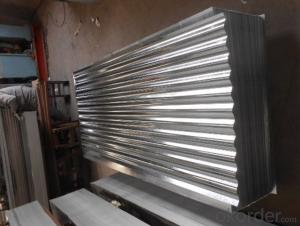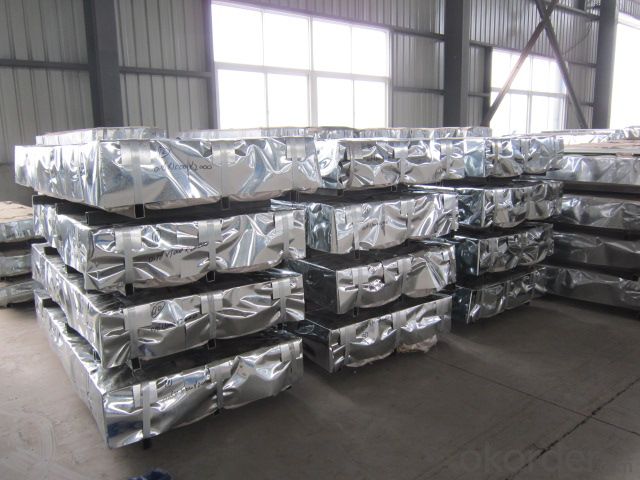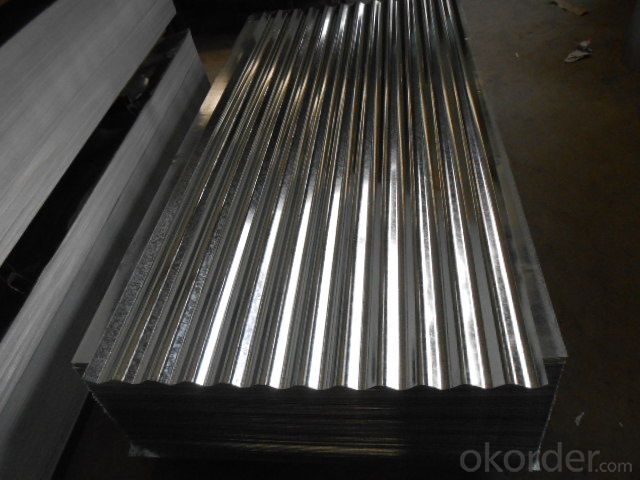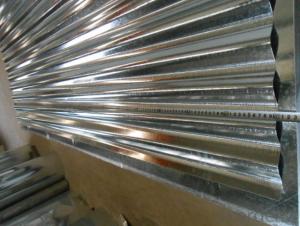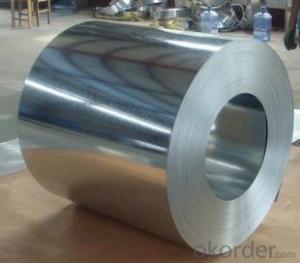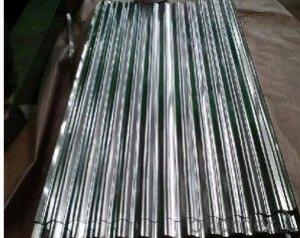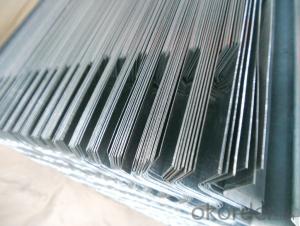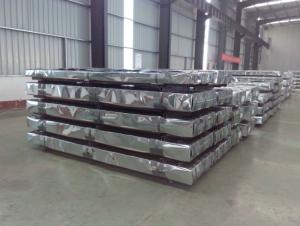Corrugated-Hot-Dip Galvanized Steel Sheet in Sheet
- Loading Port:
- Shanghai
- Payment Terms:
- TT OR LC
- Min Order Qty:
- 25 m.t.
- Supply Capability:
- 5000 m.t./month
OKorder Service Pledge
OKorder Financial Service
You Might Also Like
Description:
The Corrugated sheet is the steel plate which has been wave formed with the cold rolling treatment, trough especial coated dispose
Pressing steel panel with the clear line, and many colors for choice, suitable for any different building style materials, achieving satisfy effects;
Pressing steel panel can be freely incised, it can satisfy the especially designing demands. It apply on convenient construction, and anti-seismic performance, fire proof, waterproof, free of maintenance
Base sheet : galvanized steel sheet, pre painted galvanized steel sheet
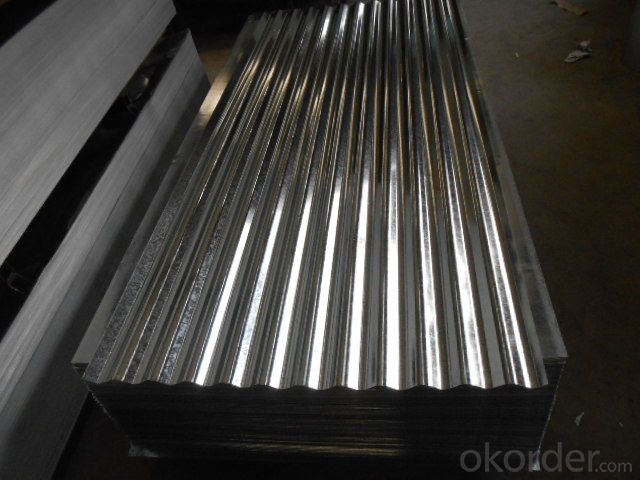
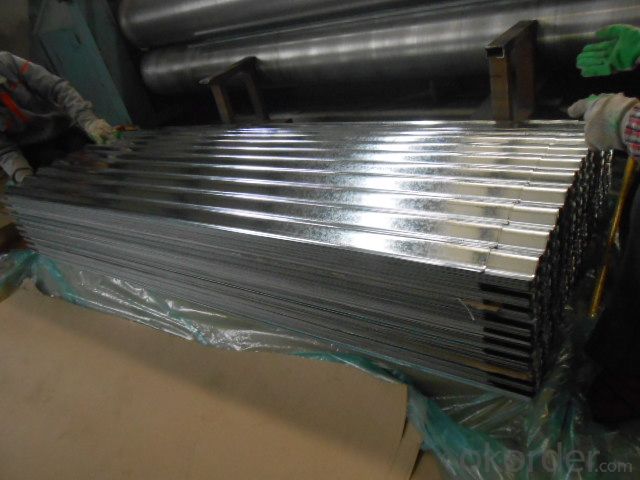
Application:
With excellent cold bending molded manufacturablity, good decoration effect, strong anti-corrosion ability, are also pollution-free and easily recycled. Accordingly, they can be used as final products and basic plates of color coated steel coils and widely applied in construction, home appliances, decoration
Pressing steel panel with the clear line, and many colors for choice, suitable for any different building style materials, achieving satisfy effects;
Product Specification:
Thickness tolerance: (+/-0.02mm)
Zinc coating: 30-180g/m2
Standard:JIS G 3302, SGCH
Package: 2- 3 ton/pallet
Specs: 0.14-0.8mm x 900mm x 2000mm
Width:700-1250mm
Surface:regular/mini/zero spangle, chromated, skin pass, dry etc.
Package:Standard seaworthy export packing:
FAQ:
1.How many pieces for one package?
The pieces for one tone is decided by the thickness of the sheet, but we can make it according to your requirements in the reasonable range.
2. Do you have pallets for the package?
Yes, we must use pallets for the package in order to load.
3. Could you produce the sheets according to our design?
Yes, we can.
- Q: Can steel sheets be used for elevator flooring or platforms?
- Yes, steel sheets can be used for elevator flooring or platforms. Steel is a durable and strong material that can withstand heavy loads, making it suitable for elevator flooring. Additionally, steel sheets can be customized to meet specific design and safety requirements for elevator platforms.
- Q: What are the different packaging options for steel sheets?
- Some common packaging options for steel sheets include bundles, coils, crates, and pallets. Bundles are typically used for smaller quantities and consist of multiple sheets bound together with metal or plastic straps. Coils are used for long sheets and are tightly wound into cylindrical shapes. Crates are wooden or metal structures that provide protection during transportation and storage. Pallets are flat structures on which steel sheets are stacked and secured using straps or stretch wrap. These packaging options ensure safe handling and transportation of steel sheets while preventing damage or deformation.
- Q: What is the price range of steel sheets?
- The price range of steel sheets can vary greatly depending on factors such as the type of steel, thickness, size, and market demand. It is advisable to check with suppliers or conduct research to get specific and up-to-date pricing information.
- Q: How do steel sheets compare to other materials, such as aluminum or stainless steel?
- Steel sheets have distinct advantages over other materials like aluminum or stainless steel. Steel is known for its exceptional strength and durability, making it an ideal choice for applications that require high structural integrity. Compared to aluminum, steel sheets offer superior tensile strength and resistance to impact, making them more suitable for heavy-duty applications. Stainless steel, on the other hand, provides excellent corrosion resistance, but it may not match the strength of steel. Overall, steel sheets are a versatile material that strikes a balance between strength, durability, and cost-effectiveness, making them a popular choice in various industries.
- Q: Are steel sheets suitable for railway carriages?
- Indeed, railway carriages find steel sheets to be a fitting option. The robustness, resilience, and capacity to endure the ceaseless strain linked with train operations render steel a favored material for these carriages. Steel sheets provide the essential structural strength to uphold the carriage and its occupants, simultaneously safeguarding against impacts and harsh weather conditions. Furthermore, steel boasts relative cost-effectiveness and widespread accessibility, rendering it an optimal selection for the creation of railway carriages.
- Q: What is the difference between a standard and high-strength steel sheet?
- The mechanical properties and performance characteristics distinguish standard steel sheets from high-strength steel sheets. Standard sheets are typically made from low to medium carbon steel, having a yield strength of approximately 250 MPa. These sheets are commonly utilized in applications that do not require extreme strength or resistance to deformation. In contrast, high-strength steel sheets contain a higher carbon content and alloying elements like manganese, chromium, or nickel. This composition empowers them with significantly higher yield strengths, ranging from 350 to over 1,000 MPa. Consequently, high-strength steel sheets offer improved resistance to deformation, higher tensile strength, and enhanced durability. Given their superior mechanical properties, high-strength steel sheets are often chosen for applications that necessitate heightened strength-to-weight ratios, such as automotive components, structural parts, and heavy machinery. These sheets can withstand greater loads, endure extreme conditions, and provide superior protection in the event of impact or sudden forces. While standard steel sheets are more readily available and less costly, high-strength steel sheets are preferable in situations where exceptional strength and performance are imperative. However, it is important to note that high-strength steel sheets may present challenges in terms of forming, welding, or machining due to their increased hardness. Therefore, careful consideration of the specific application requirements is vital when deciding between standard and high-strength steel sheets.
- Q: Can steel sheets be used for water treatment facilities?
- Yes, steel sheets can be used for water treatment facilities. Steel is a durable and corrosion-resistant material, making it suitable for various components such as pipes, tanks, and structures in water treatment facilities. Additionally, steel sheets can be easily fabricated and installed, making them a practical choice for water treatment infrastructure.
- Q: What is the specific heat capacity of steel sheets?
- The specific heat capacity of steel sheets varies depending on the specific type of steel being used. However, on average, the specific heat capacity of steel ranges from 460 to 520 joules per kilogram per degree Celsius (J/kg°C).
- Q: Are steel sheets resistant to vibration or shaking?
- Yes, steel sheets are resistant to vibration or shaking due to their strong and rigid nature.
- Q: What are the different grades of steel sheets available?
- There are several grades of steel sheets available, each with its own unique properties and uses. Some of the commonly used grades include: 1. Carbon Steel: This is the most common and widely used grade of steel sheet. It contains varying amounts of carbon and is known for its strength and durability. Carbon steel sheets are used in a wide range of applications, including construction, automotive, and manufacturing. 2. Stainless Steel: This grade of steel sheet contains high levels of chromium, which provides excellent corrosion resistance. Stainless steel sheets are commonly used in industries such as food processing, chemical, and medical, where resistance to corrosion is crucial. 3. Galvanized Steel: This type of steel sheet is coated with a layer of zinc to protect it from corrosion. Galvanized steel sheets are often used in outdoor applications, such as roofing, fences, and gutters, where exposure to moisture and the elements is common. 4. Alloy Steel: This grade of steel sheet is made by adding other elements, such as manganese, nickel, or chromium, to improve its mechanical properties. Alloy steel sheets are commonly used in applications that require high strength, such as construction equipment, aircraft parts, and machinery. 5. Tool Steel: This grade of steel sheet is designed to have high hardness and wear resistance, making it suitable for use in tools and dies. Tool steel sheets are commonly used in industries such as automotive, aerospace, and manufacturing. It's important to note that these are just some of the grades of steel sheets available, and there are many more specialized grades tailored for specific applications. The choice of grade depends on factors such as the required strength, corrosion resistance, and specific application requirements.
Send your message to us
Corrugated-Hot-Dip Galvanized Steel Sheet in Sheet
- Loading Port:
- Shanghai
- Payment Terms:
- TT OR LC
- Min Order Qty:
- 25 m.t.
- Supply Capability:
- 5000 m.t./month
OKorder Service Pledge
OKorder Financial Service
Similar products
Hot products
Hot Searches
Related keywords
